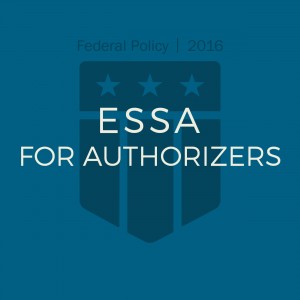Don’t forget to bookmark our new ESSA for Authorizers page for updates and resources to help you during this critical transition period.
It is important to remember that each State will individually decide how to proceed under this guidance. NACSA encourages authorizers to remain in close contact with their State Education Agency for final guidance.
The new federal education law grants the Department of Education the ability to waive certain NCLB or Waiver requirements in the interest of a smooth transition to the new law (ESSA) with a January 2017 cross-over target. One of the main features of the new ESSA is a new set of guidelines on what types of performance indicators can be included in a state assessment and accountability system. Generally, these new guidelines give states and school districts much more flexibility in what performance indicators they choose and what options states, school districts, and schools have to address low performing schools.
States will be able to move towards different performance indicators as they prepare new plans for Title I compliance under this new law. In the interest of making it easier for states to start that planning and implementation process, the Department is starting to waive NCLB requirements that don’t have a clear ESSA equivalent. They are also modifying certain requirements to better align any “triggers” from NCLB with the approaches in ESSA and the transition timelines.
What specifically, in the language of federal policy, does the guidance say?
- All States must continue to issue annual report cards for schools and school districts for the 14/15 and 15/16 school years that include school and sub-group level data. These report cards must include proficiency metrics, and must continue to show comparisons of student achievement at the district and school level, including by student subgroups.
- The US Department of Education will not require States to update or report on progress in Annual Measurable Objectives (AMOs) for the 14/15 or 15/16 school years. AMOs are expressed differently in each State’s report card system, but they are generally yearly markers of progress towards long term goals. They are commonly expressed as part of the student growth goals in a state, particularly for population subgroups. States will not be required to include these AMO metrics in their 14/15 and 15/16 report cards. As a result, some traditional components of the state report card may be based on different data points or may be unavailable.
- States can choose between two options for the Priority and Focus school lists: 1) They may freeze the current Priority and Focus school lists as of December 10, 2015, maintaining the current identifications; or 2) They may choose to exit schools and identify new priority and focus schools. In either scenario the list of priority and focus schools generated by the State would be in place through the 16/17 school year and identified schools would be subject to their intervention plan through that time. States must inform the US Department of Education of which option they will choose by January 29, 2016.
What resources would be most valuable to you as you navigate this transition? Let us by contacting [email protected].



